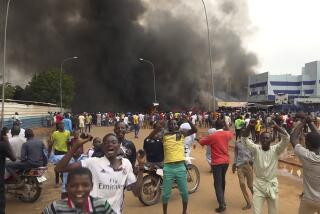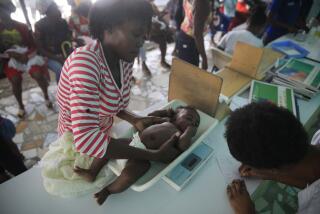THE WORLD : ZAIRE : A Geographic Label Is No Match for a Killer Virus
- Share via
LONDON — And now, from a remote Africa, more bad news. In Zaire, there is ran outbreak of Ebola, a killer virus without an antidote. But our world is wracked with disasters: Must we care about this one?
One reason why we must is that Zaire is a very big country, as far spread even as one-third of the United States. Another reason is that Zaire borders on other big countries. Its rivers flow into many neighboring lands. There can be no way to isolate Zaire or its epidemics. Elsewhere, AIDS has already shown us this.
But whatever the medical prognosis, this looming tragedy has political roots, social origins, everyday connections. We know that these have grown out of the history of European invasion: out of the colonial dispossession of Zaire’s peoples.
We know this vast land was once the home of stable and enduring societies whose arts, for example, produced some of Africa’s finest work. We also know this African form of civilization was ruined by piratical European invasions led by a Belgian king called Leopold. Over some 30 years of reckless violence, Leopold’s agents reduced the wide basin of the Congo River to what Europe then called “the heart of darkness.” And the name had become well-deserved. Such were the horrors in Leopold’s wake that the Belgian state, in 1908, had to take control.
The Belgians transformed the Congo basin--Zaire today--into an orderly colonial enterprise. Yes: but the cost of doing this was, in all dimensions, a total dispossession of the people of Zaire. Instead of being restored to citizenship of their country, they were voiceless objects of foreign rule. When at last, in 1960, this people was left to run their own country after 80 years of dispossession, they no longer had the skills and experience to do this. Trouble ensued, a lot of trouble.
At that dismal point, the only political force with some coherent vision of a national future was an anti-colonial movement led by a young patriot called Patrice Lumumba. He began trying to make sense of a new-found independence. Within months, he was murdered by rivals backed by foreign interests.
With the Cold War then raging, world powers began competing for control of this potentially wealthy land. The hasty answer they came up with was an ambitious soldier named Joseph D. Mobutu, whom they treated as their useful instrument. Backed by the West, Mobutu proceeded to make himself the dictator of Zaire. That was in 1965.
Widespread resistance followed. Mobutu’s backers beat it down by giving him the means to be an all-powerful military boss. Since 1970, he has ruled through a reckless network of family clients and other henchmen. I have heard it argued that he had to do this to survive. But while Mobutu has undoubtedly survived, Zaire as a functioning state has not. Zaire has become little more than a geographical label. Mobutu’s men care about their deals and bribes, but little else. Administratively, Zaire is cut down to being Mobutu’s extended-family racket.
Consider only the country’s road network. Early in the 1950s, when I first traveled there, the people of Zaire could rely on some 80,000 miles of usable roadway. After years of Mobutu’s dictatorship, a Financial Times survey, in 1985, found this total had been let fall to 12,000 miles of passable roads. Outside the zones and towns of export profit-making, plantation crops or minerals, there was really no government. Extensively abandoned, this country had “gone back to bush,” where it remains. Meantime, Mobutu and his henchmen are multimillionaires.
The outside world, it seems, has neither known nor cared about any of this. An increasingly desperate people has had a different view. Sometimes their protests have managed to break through the silence guarded by the dictatorship. In 1976--nearly 20 years ago!--a courageous priest, Archbishop Kabanga of Kinshasa, the country’s capital, issued a memorable protest that could not be stifled. “How many children,” he asked but was not answered, “die without medical care, or any chance of receiving any? Why are there no medical supplies in the hospitals, although these can be found in the marketplace? Why can justice be got in our courts only by fat bribes to the judge?” If prisoners rot in jail, he went on, this is because “they have no one to pay off the judge who sits on the papers.” If anything has changed since the archbishop’s protest, it is only for the worse.
Mobutu continues to sit at the center of his web of profiteers and strong-arm men. Lately, it is reported, he prefers to sit behind the guns of a river steamer anchored near his capital. The prudent inhabitant minds his or her own business. Mostly, this is now an illegal enterprise.
All too clearly, there is no quick or easy way for Zaire to come alive again. Yet, there is at least a wealth of experience and energy that can point to positive answers. These do not include violent or paternalist intervention by any outside power. That would help no more here than in Somalia.
What we can be sure of is that the people of Zaire would dearly like to get rid of strong-arm government. They almost managed to do this four years ago, but failed through lack of outside interest and encouragement.
All this being so, what the responsible outside world can best do, at this stage, is to turn on Zaire the searchlight of responsible inquiry, and very clearly reveal the political terrain that this people, somehow, has to traverse. That will be less difficult than it may seem. Even in Mobutu’s Zaire, there are public organizations, obscure but active, striving to make headway against the chaos. They include farmers’ cooperatives, among the best of them led by women; self-help organizations in the towns; a variety of community teams and collectives stemming often from Africa’s pre-colonial tradition of local government. They can be seen as the founding necessities for the launch of democratic politics.
These many organizations and groups of individuals need, today, the self-confidence and encouragement that independent inquiry can, at any rate, begin to
provide. Perhaps now it is sound and stern publicity, by every means that outside media can find and use, that will do the most good. And this is urgent.
From those forgotten forests and savannas, while this present tragedy unfolds and deepens, there comes the unbearable sound of a cry for help, truly a desperate cry that has to be answered. We have to find out how best to answer.
More to Read
Sign up for Essential California
The most important California stories and recommendations in your inbox every morning.
You may occasionally receive promotional content from the Los Angeles Times.










